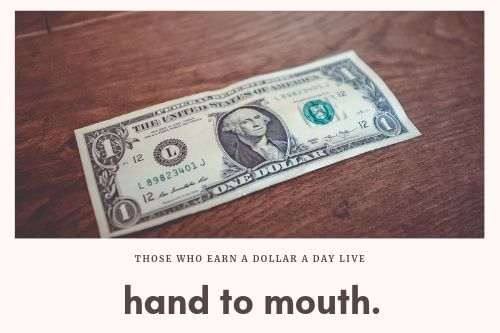
YouTube / iTunes / Spotify / Radio Public / Pocket Casts / Google Podcasts / Breaker / Overcast
Listen to ArtisanEnglish.jp posts & lesson intros here.
WotD: Hand-to-mouth
A common theme of my posts seems to be money.
Today is no different because a hand-to-mouth existence is a tough way to live.
Some of us are lucky enough to have managed to put away a little rainy day fund for unexpected emergencies.
Refrigerators don’t break down very often, but when they do, we cannot delay replacing them.
A malfunctioning fridge requires repair or replacement immediately.
Unfortunately, many families these days live what we call hand to mouth and could never afford that.
This means they barely have enough money to live on.
As soon as the paycheck comes in, it goes right back out again.
At the end of the month, there is rarely a spare dime to put in a rainy-day fund.
It’s the same all over.
Whether you’re in Japan, Canada or Britain, people are living hand to mouth.
In many cases, they are middle-class people you’d never suspect experiencing financial difficulty.
They can hide it well until something unexpected happens.
Hundreds of thousands of families are teetering right on the cusp of the abyss.
Wages have not significantly increased in almost fifteen years and didn’t keep up with inflation.
Even though many companies have experienced record profits, they refuse to share them with employees.
Many families are, therefore, barely getting by hand to mouth.
Any slight change, such as a breadwinner becoming ill or an economic downturn, can tip them over the edge into poverty.
I know this firsthand from growing up in a family with five kids and only my father working.
There was never any money to put in a rainy day fund, even though my father didn’t work on rainy days.
He worked for a roofing company.
Flesch-Kincaid Readability Test
This post is understandable by someone with at least an 8th-grade education (age 13 – 14).
On the Flesch-Kincaid reading-ease test, this post scores 66.
The easier a passage is to read, the higher the score on a scale of 0 – 100.

